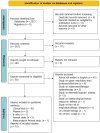The Impact of Thermal Water in Asthma and COPD: A Systematic Review According to the PRISMA Statement
- PMID: 38398384
- PMCID: PMC10889407
- DOI: 10.3390/jcm13041071
The Impact of Thermal Water in Asthma and COPD: A Systematic Review According to the PRISMA Statement
Abstract
Background: Asthma and chronic obstructive pulmonary disease (COPD) are global health challenges leading to substantial morbidity and mortality. While existing guidelines emphasize evidence-based treatments, the potential therapeutic role of thermal water (TW) inhalation remains under-investigated.
Methods: This systematic review followed PRISMA-P guidelines and sought to evaluate the impact of TW in asthma and COPD. A thorough literature search, performed up to May 2023, encompassed in vitro, in vivo, randomized controlled trial (RCT), non-RCT, and observational studies.
Results: The review included 12 studies reporting different findings. In vitro studies suggested TW could enhance antioxidant capacity and cell proliferation. In a murine model of non-atopic asthma, TW inhalation reduced airway hyperresponsiveness and inflammation. RCTs in COPD patients indicated mixed effects, including improved quality of life, reduced airway oxidant stress, and enhanced exercise tolerance. Asthma patients exposed to water aerosols exhibited improved lung function and reduced airway inflammation. Non-RCTs showed improved lung function and antioxidant activity after TW therapy. Additionally, observational studies reported enhanced lung function and reduced airway inflammation.
Conclusion: The current evidence suggests potential benefits of TW therapy in asthma and COPD. However, limited high-quality RCTs and concerns regarding occupational TW exposure necessitate further investigation. While TW therapy offers a non-invasive treatment, its therapeutic potential still needs definitive demonstration. Future research should therefore prioritize well-designed RCTs to thoroughly establish the efficacy and safety of TW as a potential therapeutic intervention for asthma and COPD.
Keywords: COPD; asthma; systematic review; thermal water.
Conflict of interest statement
The authors declare no conflicts of interest.
Figures


Similar articles
-
[Standard technical specifications for methacholine chloride (Methacholine) bronchial challenge test (2023)].Zhonghua Jie He He Hu Xi Za Zhi. 2024 Feb 12;47(2):101-119. doi: 10.3760/cma.j.cn112147-20231019-00247. Zhonghua Jie He He Hu Xi Za Zhi. 2024. PMID: 38309959 Chinese.
-
Impact of Single Combination Inhaler versus Multiple Inhalers to Deliver the Same Medications for Patients with Asthma or COPD: A Systematic Literature Review.Int J Chron Obstruct Pulmon Dis. 2020 Feb 26;15:417-438. doi: 10.2147/COPD.S234823. eCollection 2020. Int J Chron Obstruct Pulmon Dis. 2020. PMID: 32161454 Free PMC article.
-
Mortality and Morbidity Effects of Long-Term Exposure to Low-Level PM2.5, BC, NO2, and O3: An Analysis of European Cohorts in the ELAPSE Project.Res Rep Health Eff Inst. 2021 Sep;2021(208):1-127. Res Rep Health Eff Inst. 2021. PMID: 36106702 Free PMC article.
-
Diet and obstructive lung diseases.Epidemiol Rev. 2001;23(2):268-87. doi: 10.1093/oxfordjournals.epirev.a000806. Epidemiol Rev. 2001. PMID: 12192737 Review.
-
The future of Cochrane Neonatal.Early Hum Dev. 2020 Nov;150:105191. doi: 10.1016/j.earlhumdev.2020.105191. Epub 2020 Sep 12. Early Hum Dev. 2020. PMID: 33036834
Cited by
-
Beneficial effects of thermal waters on respiratory diseases: a systematic review.Int J Biometeorol. 2025 May;69(5):915-946. doi: 10.1007/s00484-025-02865-z. Epub 2025 Mar 25. Int J Biometeorol. 2025. PMID: 40133662 Free PMC article.
References
-
- Agustí A., Celli B.R., Criner G.J., Halpin D., Anzueto A., Barnes P., Bourbeau J., Han M.K., Martinez F.J., de Oca M.M., et al. Global Initiative for Chronic Obstructive Lung Disease 2023 Report: GOLD Executive Summary. Eur. Respir. J. 2023;61:2300239. doi: 10.1183/13993003.00239-2023. - DOI - PMC - PubMed
-
- Levy M.L., Bacharier L.B., Bateman E., Boulet L.-P., Brightling C., Buhl R., Brusselle G., Cruz A.A., Drazen J.M., Duijts L., et al. Key recommendations for primary care from the 2022 Global Initiative for Asthma (GINA) update. Prim. Care Respir. Med. 2023;33:7. doi: 10.1038/s41533-023-00330-1. - DOI - PMC - PubMed
-
- Viegas J., Esteves A.F., Cardoso E.M., Arosa F.A., Vitale M., Taborda-Barata L. Biological Effects of Thermal Water-Associated Hydrogen Sulfide on Human Airways and Associated Immune Cells: Implications for Respiratory Diseases. Front. Public Health. 2019;7:128. doi: 10.3389/fpubh.2019.00128. - DOI - PMC - PubMed
Publication types
LinkOut - more resources
Full Text Sources

